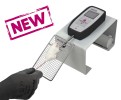Authors
Y Kishimoto, J Johnson, W Fang, et al
Lab
Laboratory of Neurosciences, National Institute on Aging Intramural Research Program, Baltimore, MD, USA
Journal
Neurobiology of Aging
Abstract
Dopaminergic neuronal cell loss in the substantia nigra is responsible for the motor symptoms that are the clinical hallmark of ParkinsonÕs disease (PD). As of yet there are no treatments that slow or prevent the degeneration of dopaminergic neurons in PD patients. Here we tested the hypothesis that dopaminergic neurons can be protected by treatment with the mitochondrial uncoupling agent 2,4-dinitrophenol (DNP) and the novel DNP prodrug MP201. We found that mice treated with low doses of DNP and MP201 were protected against motor dysfunction and dopamine neuron loss in the 6-hydroxydopamine PD model, with MP201 being more efficacious than DNP. Amelioration of motor deficits and dopamine neuron loss by MP201 treatment was associated with reductions in microglial and astrocyte activation and neuroinflammation. These preclinical findings suggest the potential application of mitochondrial uncoupling agents such as MP201 as disease-modifying therapies for PD.
BIOSEB Instruments Used:
Grip strength test (BIO-GS3)

 Pain - Thermal Allodynia / Hyperalgesia
Pain - Thermal Allodynia / Hyperalgesia Pain - Spontaneous Pain - Postural Deficit
Pain - Spontaneous Pain - Postural Deficit Pain - Mechanical Allodynia / Hyperalgesia
Pain - Mechanical Allodynia / Hyperalgesia Learning/Memory - Attention - Addiction
Learning/Memory - Attention - Addiction Physiology & Respiratory Research
Physiology & Respiratory Research
 Pain
Pain Central Nervous System (CNS)
Central Nervous System (CNS) Neurodegeneration
Neurodegeneration Sensory system
Sensory system Motor control
Motor control Mood Disorders
Mood Disorders Other disorders
Other disorders Muscular system
Muscular system Joints
Joints Metabolism
Metabolism Cross-disciplinary subjects
Cross-disciplinary subjects Preclinical studies and opioids: role in crisis management in the United States
Preclinical studies and opioids: role in crisis management in the United States 